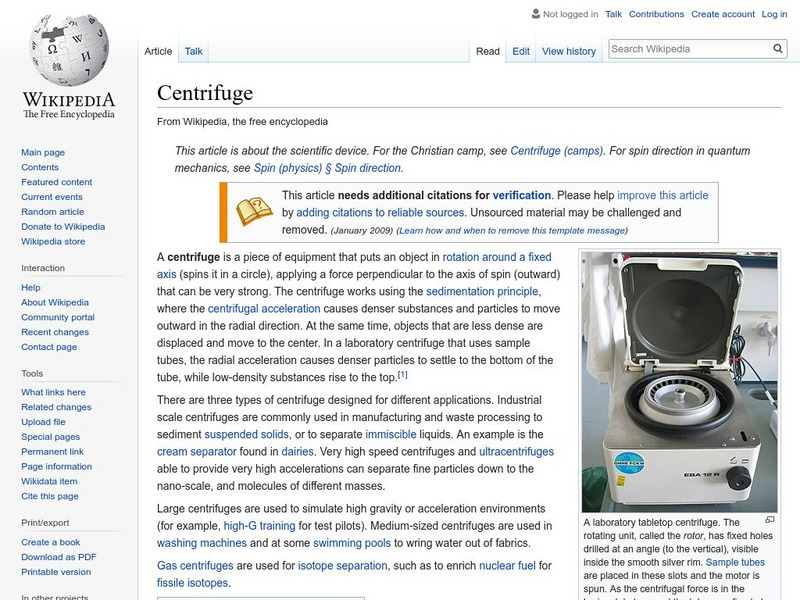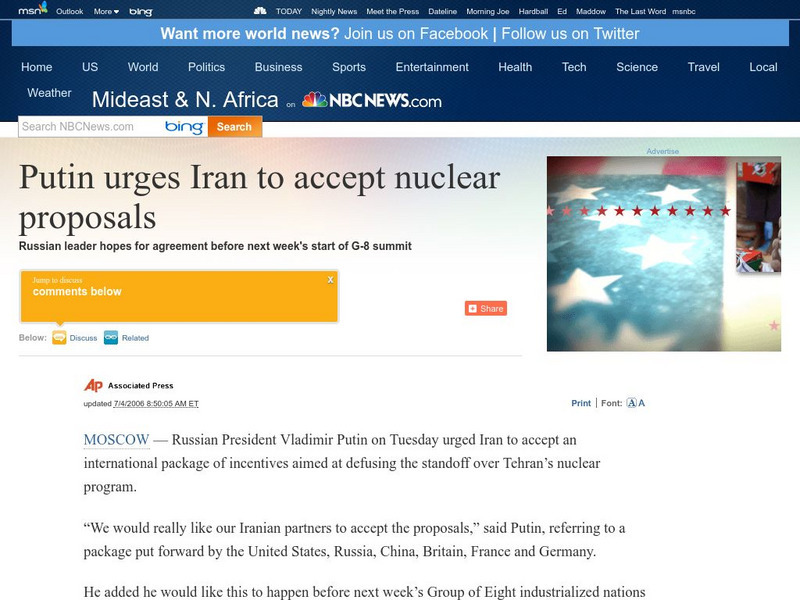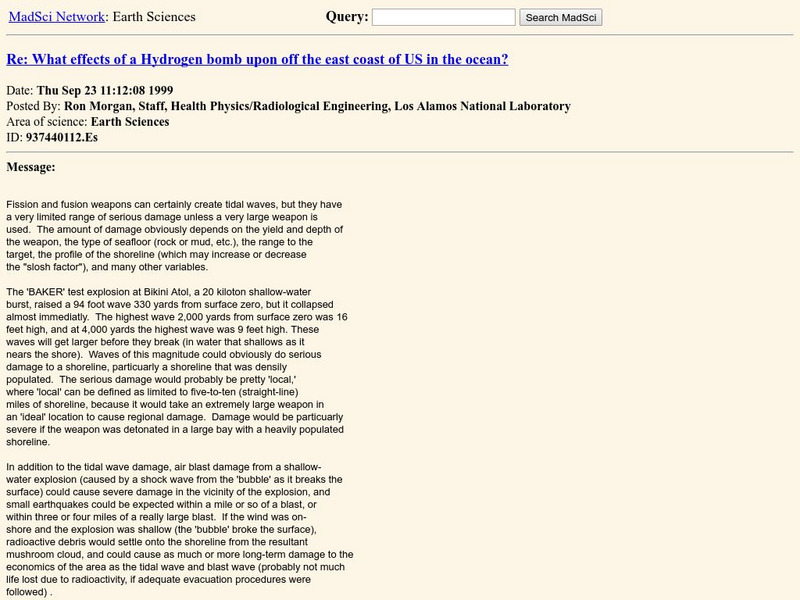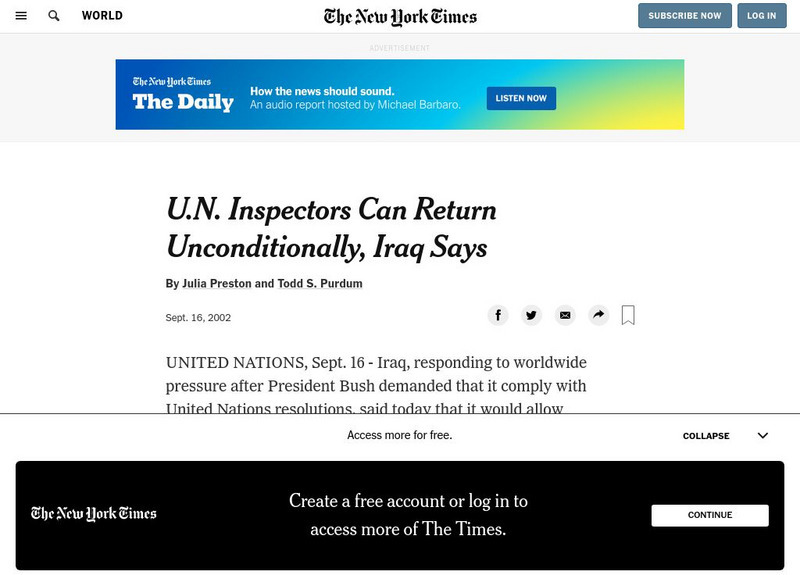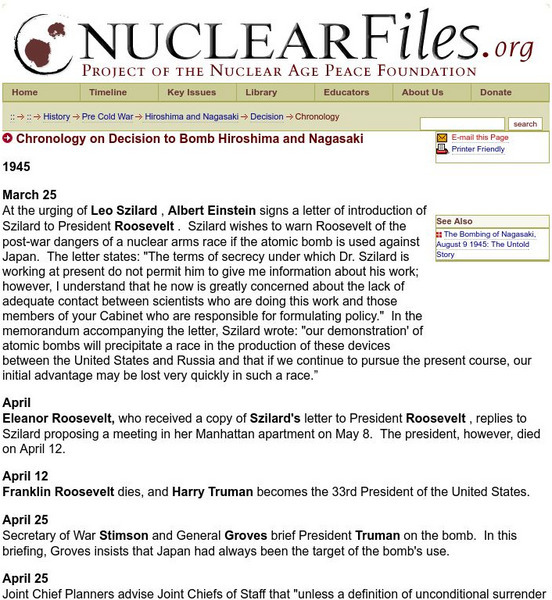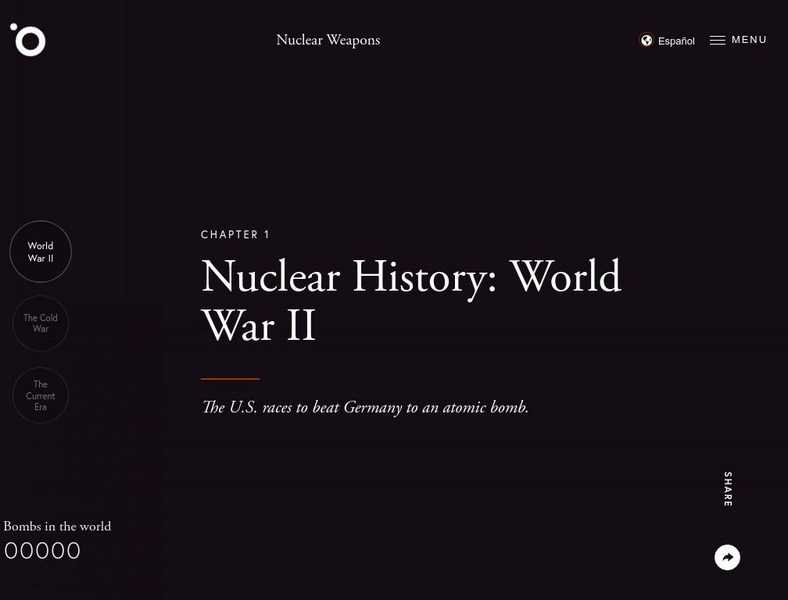American Academy of Achievement
Academy of Achievement: Mohamed El Baradei
A well-written biography of Mohamed ElBaradei, an Egyptian diplomat. While working for the United Nations, he won the Nobel Prize for Peace for his efforts to promote the peaceful use of nuclear energy, after which he returned to a...
Federation of American Scientists
Fas: National Security Policy Arms Control Disarmament
A lengthy essay describing the negotiations and politics involved in President Kennedy's quest to create a permanent ban on nuclear tests.
Choices Program, Brown University
Choices: The u.s. And Iran: Confronting Policy Alternatives
Two-period lesson plan focuses on role play and deliberation exploring four Policy Options concerning U.S. policy toward Iran. Students will identify and analyze the primary challenges posed by Iran's nuclear program for the U.S. Note:...
Center for Innovation in Engineering and Science Education, Stevens Institute of Technology
Outrider: What Happens in a Bomb Blast?
Interactive tool that in terrifying detail lets you see the impact a nuclear bomb blast would have anywhere in the world, including in your neighborhood. Learn what you can do about it.
New York Times
New York Times: Truths of the Second Nuclear Age
Identifies how many warheads different countries have throughout the world. Also provides information about the United States' and Russia's current arsenals. Discusses which countries have signed the non-proliferation treaties and which...
Khan Academy
Khan Academy: The Manhattan Project and the Atomic Bomb
Discusses the Manhattan Project of the United States which worked on developing nuclear weapons during World War II. It led to the two atomic bombs that were dropped on Japan in August 1945, ending the war with Japan.
Gilder Lehrman Institute of American History
Gilder Lehrman Institute: History Now: Online Exhibition: The Manhattan Project
[Free Registration/Login Required] Documents by Manhattan Project scientists expressing their concern about nuclear weapons after the bombings in Japan.
Wikimedia
Wikipedia: Centrifuge
Wikipedia provides detailed information and history on centrifuges in scientific research and industry, including its importance in making nuclear weapons.
Other
Project Ploughshares
Website for an ecumenical peace center of the Canadian Council of Churches. Organization formed to work towards control of weapons trade, reducing reliance on military force, abolishing nuclear weapons and building peace in the world.
Curated OER
Bbc: Global Nuclear Powers
An interactive map which shows every country that has nuclear weapons, has programs to gain nuclear weapons, had nuclear weapon programs, or is suspected of having a nuclear weapon. Click on a country for a description of that country...
NBC
Msnbc: Putin Urges Iran to Accept Nuclear Proposals
A discussion about how Vladimir Putin is pressuring Iran to accept the UN security council's nuclear package. States that Russia and China are opposed to sanctions but they will go along with the Security Council if that is what they...
MadSci Network
Msn: What Are the Effects of a Hydrogen Bomb?
From the Mad Scientist Network web site. Using a question and answer format, this page describes some potential effects of a nuclear explosion. The possibilities of tidal waves, earthquakes and radiation-related damages are discussed.
CBS
Cbs News: Mapping Brinksmanship
An analysis of the missile and nuclear programs in North Korea. Provides an interactive map which allows the user to click on each icon to get information about each different weapon or response from the world. (2008)
New York Times
New York Times: Un Inspectors Can Return Unconditionally, Iraq Says
[Free Registration/Login Required] This article deals specifically with Iraqi Foreign Minister Naji Sabri al-Hadithi's decision to let US officials into the country to investigate Iraq's Weapons Program. (September 16, 2002)
Stanford University
Stanford Report: Edward Teller, Father of Hydrogen Bomb
Students don't generally learn much about Edward Teller in school. But with the progress in science in the 20th century, maybe they should. Edward Teller was one of the main architects of the hydrogen bomb. This is a great site by...
Other
World Nuclear Association: Hiroshima, Nagasaki, and Subsequent Weapons Testing
This article has information about the bombings of Hiroshima and Nagasaki. Additional information about the measures that have been taken about atomic warfare and testing since the bombings included.
Encyclopedia of Earth
Encyclopedia of Earth: Plutonium
Information about the element, Plutonium, atomic number 94. Covers physical properties, atomic properties, how abundant it is on the Earth, and details about health-related regulations. Discusses reactor- and weapons-grade plutonium, and...
PBS
Pbs: American Experience: The Trials of J. Robert Oppenheimer
J. Robert Oppenheimer is credited with the creation of the atomic bomb. But, "The country asked him to do something and he did it brilliantly, and they repaid him for the tremendous job he did by breaking him." This documentary traces...
PBS
Pbs Frontline: Russia's Nuclear Complex
An excellent map that shows where the loose nukes are located in Russia. Click on a region of the map to see what weapons that region has,as well as information about its weapon program. From a program that aired on November 19, 1996.
BBC
Bbc News: North Korea Secretive State
A collection of in-depth reports all highlighting updated news on the country of North Korea. Discussions include nuclear testing, economic problems, history, and the people.
Other
Nuclearfiles.org: Chronology on Decision to Bomb
This detailed chronology of the events and communication of 1945-1946 shows Truman's role in the process of the decision to drop the world's first atomic bomb used in warfare upon Hiroshima and then the second upon Nagasaki. Also...
Science Struck
Science Struck: Atomic Bomb Facts
Discusses lost nuclear weapons, the power of an atomic bomb, the bombing of Hiroshima and Nagasaki, the development of the atomic bomb, the making of the hydrogen bomb, the detonation of a hydrogen bomb by Russia in 1961, and the status...
Khan Academy
Khan Academy: Atomic Fears and the Arms Race
Looks at the nuclear arms race in the 1950s as the United States and the USSR both stockpiled nuclear weapons. Includes 1951 propaganda video showing schoolchildren how to 'Duck and Cover' in the event of a nuclear attack. [9:15]
Other
Outrider: Nuclear History: World War Ii
A timeline with primary source documents and photos of the invention and use of the atomic bomb during World War II. Links to additional information and videos are also provided.
Other popular searches
- Nuclear Weapons History
- Nuclear Weapons Wwii
- Testing Nuclear Weapons
- Nuclear Weapons Development
- Controlling Nuclear Weapons
- Nuclear Weapons Cold War
- Iran Nuclear Weapons
- North Koreas Nuclear Weapons
- Nuclear Weapons in India
- Nuclear Weapons in Pakistan
- World War Ii Nuclear Weapons








